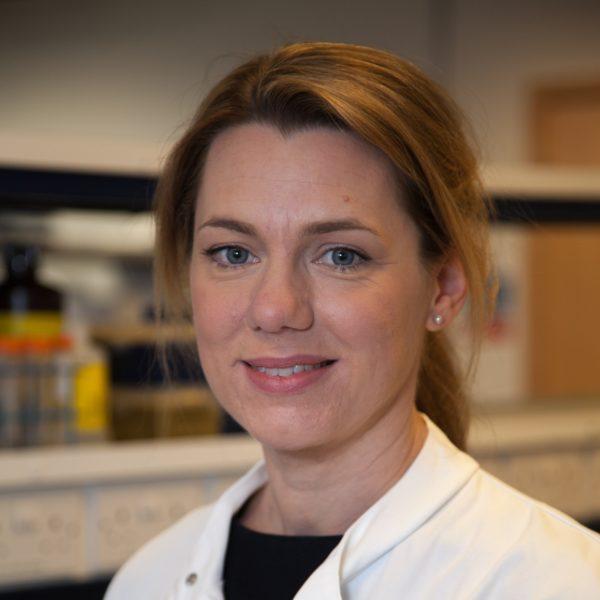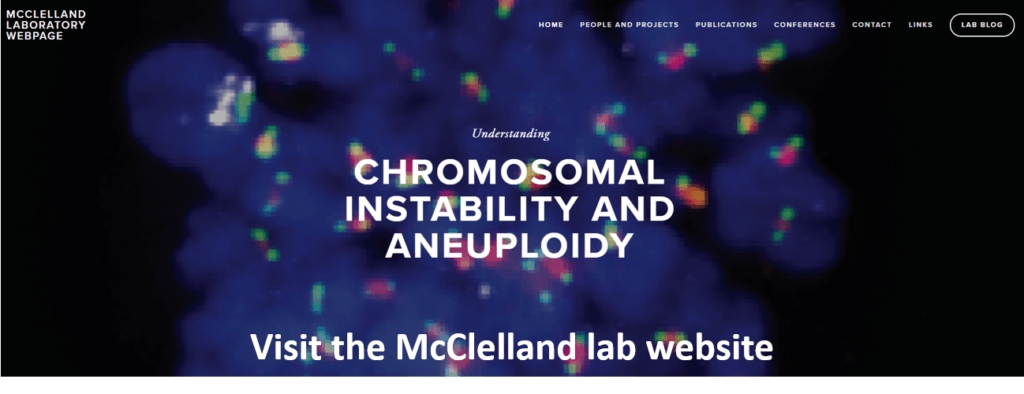
Professor Sarah McClelland
BSc, PhD
Professor of Cancer Cell Biology and Genomics
Group Leader
TwitterResearch Focus
My lab aims to understand the mechanisms that underlie numerical and structural chromosome aberrations in cancer at a molecular level, which also involves understanding how normal cells replicate and segregate their genomes.
Key Publications
Targeted assembly of ectopic kinetochores to induce chromosome-specific segmental aneuploidies. EMBO J. (2023) May 15;42(10):e111587. PMID: 37063065
Replication stress generates distinctive landscapes of DNA copy number alterations and chromosome scale losses. Genome Biol. (2022) Oct 20;23(1):223. PMID: 36266663
Specific mechanisms of chromosomal instability indicate therapeutic sensitivities in high-grade serous ovarian carcinoma. Cancer Res (2020) 80(22):4946-4959. PMID: 32998996
Watching cancer cells evolve through chromosomal instability. Nature News and Views (2019) 570(7760):166-167. PMID: 31182831
Non-Random Mis-Segregation of Human Chromosomes. Cell Reports (2018) 23(11):3366-3380. PMID: 29898405
Replication stress links structural and numerical chromosomal instability in colorectal cancer. Nature (2013), 494:492-6. PMID: 23446422
Major Funding
- 2022-2025 - Medical Research Council Multimodal Award, Integration of physiological tissue models and machine learning to understand genomic instability from oncogene activation to cancer initiation, c. £350,000
- 2021-2024 - CRUK RadNet, Predicting response to radiation therapy from cancer genomic profiles, c. £350,000
- 2021-2024 - BBSRC, The role of human transcription factor ZFP64 in centromeric transcription and maintenance of genomic stability, £426,000
- 2020-2022 - Astra Zeneca Collaborative Research Grant, Using a genetic signature of replication stress to predict sensitivity to ATR and WEE1 inhibitors, £320,000
Other Activities
- Member of the British Society for Cell Biology (BSCB)
- MDPI Cancers Young Cancer Investigator of the Year 2018
Research
 My lab aims to understand the mechanisms that underlie numerical and structural chromosome aberrations in cancer at a molecular level, which also involves understanding how normal cells replicate and segregate their genomes.
My lab aims to understand the mechanisms that underlie numerical and structural chromosome aberrations in cancer at a molecular level, which also involves understanding how normal cells replicate and segregate their genomes.
Cancer cells near-ubiquitously display abnormal numbers and structures of chromosomes, termed Chromosomal Instability (CIN). CIN can promote tumour evolution and chemotherapy resistance. This means an important goal is to understand the processes generating CIN in cancer, and to develop new ways in which to target this tumour-specific feature.
To do this we run several projects in the lab to investigate how cancer cells from a panel of different cancer types (ovarian, pancreatic, prostate and colorectal) generate chromosomal instability. We also work to understand better the fundamental process of chromosome segregation during mitosis, specifically in the context of how chromosome identity can dictate behaviour during normal, and unperturbed conditions.
Cancer cells frequently exhibit abnormalities in the number and structure of their chromosomes. These abnormalities can be generated at every cell division, meaning that a population of cancer cells can contain cells that are very different to one another. This process is termed chromosomal instability, and is associated with chemotherapy resistance and poor patient prognosis.
My lab aims to understand the mechanisms that underlie numerical and structural chromosome aberrations in cancer at a molecular level, which also involves understanding how normal cells replicate and segregate their genomes. We are interested in how mechanisms generating chromosomal instability may vary between tumour types, and in using this information to understand chemotherapy resistance and create more accurate models of chromosomal instability. Ultimately we aim to improve cancer patient survival by advancing our knowledge of processes underlying tumour drug resistance, and using this to aid treatment stratification and chemotherapy design.
Current projects:
- Mechanisms driving chromosomal instability in ovarian cancer
High-grade serous ovarian cancer (HGSOC) represents the major subtype of ovarian cancer and displays high levels of chromosomal instability. We are collaborating with the Balkwill and Lockley laboratories to investigate mechanisms driving chromosomal instability in HGSOC using cell lines, 3-D culture systems and human tissue samples.
- Understanding the relationship between replication stress and chromosomal instability
We previously identified an important role for replication stress in promoting chromosome missegregation events in colorectal cancer. However the exact molecular mechanisms underlying the generation of chromosomal instability following replication stress are not clear. Using proof-of-principle experiments in diploid cells we aim to model these processes to better understand the link between replication stress and chromosomal instability.
- Investigating the phenomenon of non-random chromosome mis-segregation
We recently discovered that during perturbed cell division particular chromosomes are prone to mis-segregate and become aneuploid (Worrall and Tamura et al, Cell Reports 2018). We are now investigating this phenomenon further with additional approaches to disrupt accurate genome replication and segregation.
Other Activities
- Member of the British Society for Cell Biology (BSCB)
- MDPI Cancers Young Cancer Investigator of the Year 2018
Major Funding
- 2022-2025 - Medical Research Council Multimodal Award, Integration of physiological tissue models and machine learning to understand genomic instability from oncogene activation to cancer initiation, c. £350,000
- 2021-2024 - CRUK RadNet, Predicting response to radiation therapy from cancer genomic profiles, c. £350,000
- 2021-2024 - BBSRC, The role of human transcription factor ZFP64 in centromeric transcription and maintenance of genomic stability, £426,000
- 2020-2022 - Astra Zeneca Collaborative Research Grant, Using a genetic signature of replication stress to predict sensitivity to ATR and WEE1 inhibitors, £320,000
- 2018-2020- CRUK Pioneer award, £200,000
- 2017-2020- Pancreatic Cancer Research Fund Project Grant, Identifying Mechanisms Driving Chromosomal Instability in Pancreatic Cancer,£180,000
- 2018-2020- Wellbeing of Women, Preventing chemotherapy resistance in Ovarian Cancer by targeting Chromosomal Instability, £130,000
- 2016-2018- Kay Kendall Leukaemia Fund, Modelling monosomy to understand poor prognosis in Acute Myeloid Leukaemia, £132,914
- 2014-2017- Barts Charity, Investigating mechanisms of chromosomal instability in High-Grade Ovarian Cancer, £186,517
Recent Publications
Disentangling the roles of aneuploidy, chromosomal instability and tumour heterogeneity in developing resistance to cancer therapies Andrade JR, Gallagher AD, Maharaj J et al. Chromosome Research (2023) 31(7)
Targeted assembly of ectopic kinetochores to induce chromosome-specific segmental aneuploidies Tovini L, Johnson SC, Guscott MA et al. EMBO Journal (2023) 42(7)
Replication stress generates distinctive landscapes of DNA copy number alterations and chromosome scale losses Shaikh N, Mazzagatti A, De Angelis S et al. Genome Biology (2022) 23(7)
The multifaceted role of micronuclei in tumour progression: A whole organism perspective. Guscott M, Saha A, Maharaj J et al. International Journal of Biochemistry and Cell Biology (2022) 152(7)
Cells on lockdown: long-term consequences of CDK4/6 inhibition Barr AR, McClelland SE EMBO Journal (2022) 41(7)
Diversity in chromosome numbers promotes resistance to chemotherapeutics Shaikh N, McClelland SE Developmental Cell (2021) 56(7) 2399-2400
Chromosome Instability through the Ages: Parallels between Speciation and Somatic (Cancer) Evolution MacDonald C, McClelland SE Trends in Genetics (2021) 37(7) 691-694
Cellular and Immunobiology Moghul M, McClelland S, Rajan P (2021) (7) 1-11
Specific mechanisms of chromosomal instability indicate therapeutic sensitivities in high-grade serous ovarian carcinoma. Mcclelland S, Tamura N, Shaikh N et al. Cancer Research (2020) (1)
Strands of evidence about cancer evolution Graham TA, McClelland SE Nature (2020) 583(7) 207-209
For additional publications, please click hereTeam
Postdoctoral Researchers
- Nadeem Shaikh
- Sarah Johnson
- Audrey Lumeau
- James Scarth
PhD Students
- Molly Guscott
- Joana Andrade
- Jovanna Maharaj
- Annie Gallagher
Biography
- Aug 2013: Established laboratory at the Barts Cancer Institute, Queen Mary University of London (UK).
- Jan 2009-Aug 2013: Post-doctoral Research Fellow with Professor Charles Swanton at the Cancer Research UK London Research Institute, UK. Integrating genomics and cell biological analysis to identify genes and mechanisms promoting chromosomal instability in cancer.
- Mar 2005-Jan 2009: Post-doctoral Research Fellow with Dr A. McAinsh at the Marie Curie Research Institute, Surrey, UK. Investigating the function of novel human kinetochore proteins.
- Aug 2003-May 2004: Post-doctoral Research Fellow with Dr P. Bianco at the Center for Single Molecule Biophysics, State University of New York (SUNY) at Buffalo, USA. Single molecule experiments with the human recombination protein hRad54 and investigating the properties of novel DNA dyes.
- Oct 1999-Aug 2003: PhD in Biochemistry with Dr M. Szczelkun at the University of Bristol, UK. Translocation by Type I Restriction Endonucleases
I am part of the Programme Team for the Cancer Genomics & Data Sciences MSc Programme at BCI, Queen Mary University of London. Find out more about the programme.
